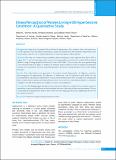Please use this identifier to cite or link to this item:
https://hdl.handle.net/20.500.14356/967| Title: | Illness Perception of Women Living with Hypertensive Condition: A Qualitative Study |
| Authors: | KC, Deepti Poudel, Sharmila Shrestha, Shreejana Thakuri, Surya Bahadur Hamal |
| Citation: | KCD., PoudelS., ShresthaS., & Hamal ThakuriS. B. (2023). Illness Perception of Women Living with Hypertensive Condition: A Qualitative Study. Journal of Nepal Health Research Council, 20(3), 677-682. https://doi.org/10.33314/jnhrc.v20i3.3795 |
| Issue Date: | 2022 |
| Publisher: | Nepal Health Research Council |
| Keywords: | Experiences Hypertension perceptions women |
| Series/Report no.: | July-Sep, 2022;3795 |
| Abstract: | Abstract Background: Many facets of a patient's life are affected by hypertension. Also, attitudes, values, and experiences, as well as patients' social and cultural circumstances, all play an essential role in the treatment of hypertension. The study's primary objective was to explore hypertensive women's perceptions of their illnesses. Methods: The study was conducted using a qualitative phenomenological research approach from March 2021 to August 2021. A total of twelve hypertensive women were purposefully selected from the medical OPD of Gandaki Medical College Teaching Hospital and Research Centre (GMCTHRC). The necessary data were gathered using a semi-structured interview guide. In addition, the thematic analysis method was used to analyze the transcribed material. The Consolidated Criteria for Reporting Qualitative Research (COREQ) checklist was used when drafting this paper. Results: Four major themes were generated; i) Perceptions towards hypertension, ii) Diagnosis, treatment, and management of hypertension, iii) Adherence to medications, and iv) Experiences with health care and recommendations. The majority of hypertensive women considered hypertension to be a treatable non-communicable illness. Family members greatly aided drug adherence. There were, however, certain financial hurdles to medication compliance. For half of the patients, the healthcare systems were unsatisfactory. Conclusions: The findings suggest that hypertensive women's non-adherence to medication is a common occurrence that reflects a conscious decision based on her knowledge and views of the medical illness and its treatment. The way women think about hypertension needs to alter. There were knowledge gaps discovered, emphasizing the need for more patient education. Keywords: Experiences; hypertension; perceptions; women. |
| Description: | Original Article |
| URI: | http://103.69.126.140:8080/handle/20.500.14356/967 |
| ISSN: | Print ISSN: 1727-5482; Online ISSN: 1999-6217 |
| Appears in Collections: | Vol 20 No 3 Issue 56 july-Sep, 2022 |
Files in This Item:
| File | Description | Size | Format | |
|---|---|---|---|---|
| 3795-Manuscript-30775-1-10-20230314.pdf | Fulltext Download. | 215.96 kB | Adobe PDF |  View/Open |
Items in DSpace are protected by copyright, with all rights reserved, unless otherwise indicated.
